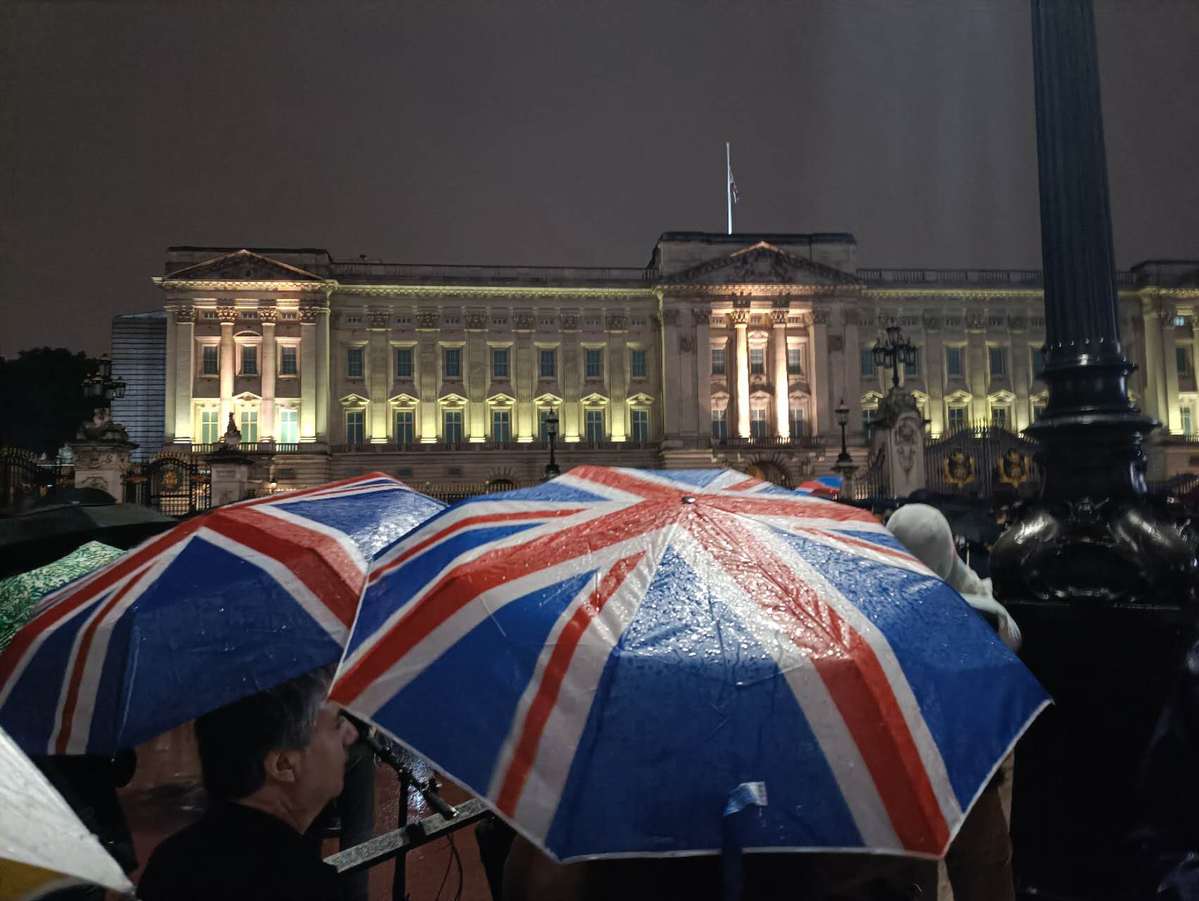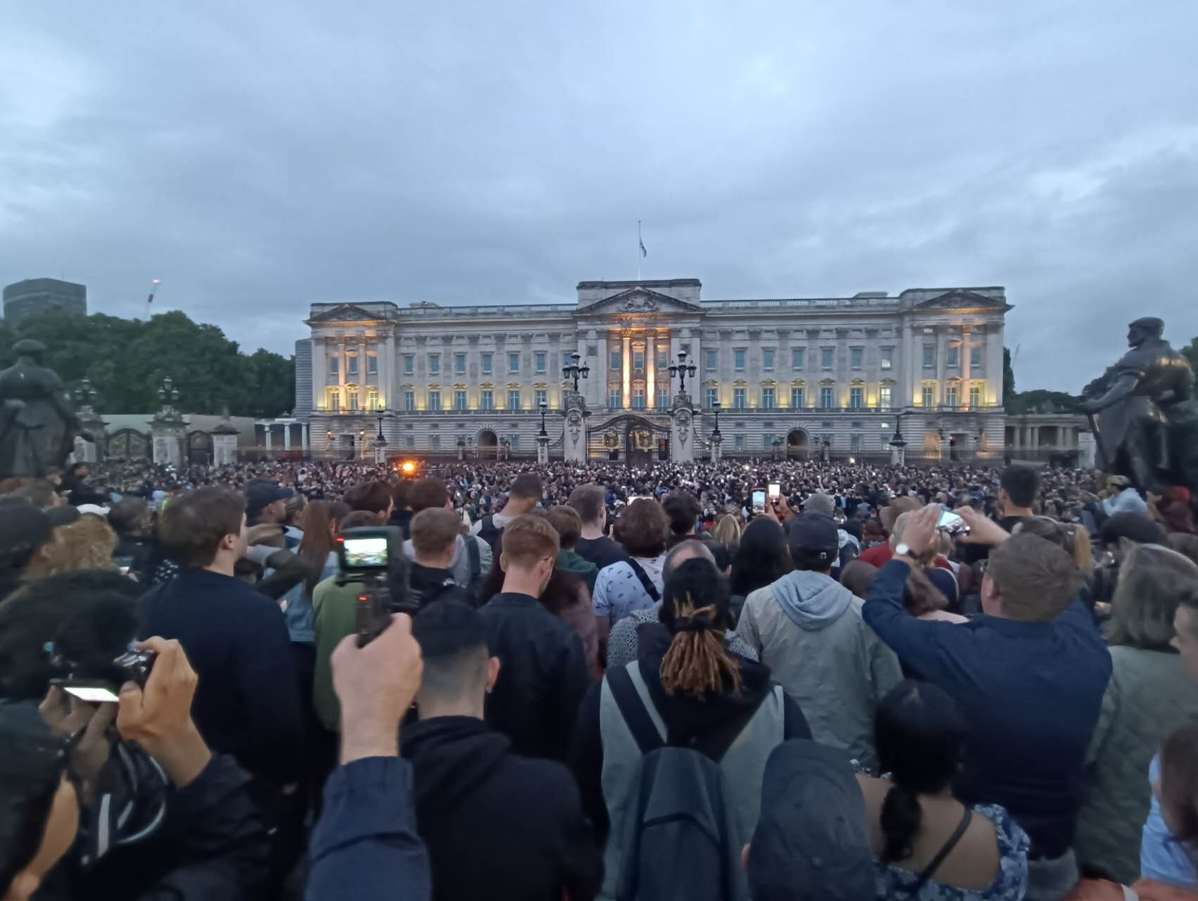Queen's death marks end of Elizabethan era
By Julian Shea in London | chinadaily.com.cn | Updated: 2022-09-09 03:31

The end of any life is a time to look back and reflect on the historic events it has witnessed — and rarely can that be so more than in the case of Queen Elizabeth II, whose life encompassed several transformations of the world stage.
The 96-year-old, whose death at Balmoral in Scotland was announced by Buckingham Palace shortly after 6 pm on Thursday (Sept 8 2022), was born before the advent of talking pictures, and lived to see the era of virtual reality and AI.
She arrived in a world where her grandfather King George V was the Emperor of India, and left it with Britain still finding its feet on the world stage following its exit from the European Union.
Her life encompassed the rise of fascism and the fall of the Berlin Wall, World War II, the conquest of space, the global financial crisis, the COVID-19 pandemic, and the Russia-Ukraine conflict.
Not only did she live to be the oldest monarch — only two of her predecessors had lived past the age of 80 — but she also became the longest-serving monarch in the history of the United Kingdom, a figure of seemingly immovable permanence and dependability on the world stage, while leaders of so many countries came and went.

The woman she surpassed as the longest reigning monarch was her great-grandmother, Queen Victoria, whose era was known as the Victorian age. Similarly, the 70 years, seven months and two days of her reign became the modern Elizabethan age.
Born on April 21, 1926, Elizabeth Alexandra Mary Windsor was the first child of Albert, Duke of York, and his wife, formerly Lady Elizabeth Bowes-Lyon. The young Elizabeth and sister Margaret, four years her junior, enjoyed a comfortable, happy and close family childhood, but all their lives were transformed in December 1936.
Following a dispute over his wish to marry American divorcee Wallis Simpson, the Queen's uncle, King Edward VIII, abdicated the throne before he was even crowned, and out of the blue, her shy, stammering father was thrust into the spotlight as the country's next king, a role he had never expected to take — and with him, into that spotlight, he took his wife and two daughters.
The story of the Queen's father, known as King George VI, and his struggle to adapt to his new role in life is told in the film The King's Speech. His 16 years on the throne, from 1936 to 1952, took in one of the most turbulent periods in modern British history, including World War II, the fragmentation of the Empire, and the construction of a new Britain.
In 1952, when the young Princess Elizabeth — who in 1947 had married her third cousin, Prince Philip — was on a trip to Kenya, the news came through of the death of her father, aged just 56. At the age of 25, Princess Elizabeth became Queen Elizabeth II, and a new era had begun, one that has only ended now, 70 years later.

The Queen and the Duke of Edinburgh, a title her husband was given on their wedding day, had four children; Charles, Anne, Andrew and Edward. They, in turn, produced eight grandchildren and 12 great-grandchildren, the most recent addition being Andrew's grand-daughter, Sienna Elizabeth Mapelli Mozzi, born in September 2021, and as those around them struggled, the royal couple's marriage remained a rock of solidity until the Duke's death on Apr 9, 2021, aged 99.
In contrast, of her children's marriages, only Edward's has survived, with the high-profile separation of Charles and his wife, Diana, Princess of Wales, in 1992 being the darkest moment of what the Queen called an 'annus horribilis', which also saw Anne divorced and Andrew separate from his wife, before the year ended with a serious fire at Windsor Castle.
Events of 1997 took an even darker turn, however, when the fallout of the shock death of Diana in a car crash in Paris caused the biggest crisis for the royal family since the abdication.
As the nation reeled and saw spontaneous displays of mass public emotion, unlike anything normally expected of the British, the perceived lack of reaction from the Royal family and the Queen was totally out of step with the national mood.
Rattled by this, the Queen made a live televised address the night before Diana's funeral, and the mood abated, but this was a rare example of the woman who was regarded for so many years as the nation's grandmother failing to gauge public feeling.
If the 80s and 90s were troubled times for the royals, the turn of the millennium ushered in a new era of optimism.
Her Golden Jubilee in 2002 marked 50 years on the throne, with a chain of celebratory beacons lit the length and breadth of the British Isles, and four years later, she celebrated her 80th birthday.
But it was 2012 that was the truly vintage year, with first the celebrations of her Diamond Jubilee, to honor 60 years on the throne, and then the London 2012 Olympics, which she formally opened, as well as appearing in a short comedy film as part of Danny Boyle's dazzling opening ceremony.
Dark days soon returned, however.

Family tensions arose again in January 2020, when her grandson Harry, Duke of Sussex, announced that he and his wife Meghan would be stepping away from royal duties, causing a rift that has clearly upset many family members.
The build-up to the Queen's Platinum Jubilee in 2022 saw Prince Andrew the focus of world attention because of his connections to convicted sex offender Jeffrey Epstein, and his subsequent public disgrace and removal from public life did significant damage.
One of the Queen's greatest strengths, both on the domestic and world stages, was her detachment from politics. In a lifetime travelling the world, she was entertained by and hosted countless monarchs, presidents and heads of state.
She met every president of the United States during her reign, except Lyndon B Johnson, who she would have met at John F Kennedy's funeral had she not missed the trip as she was pregnant with Edward.
In addition, the Queen saw 15 British prime ministers during her reign, from Winston Churchill to Liz Truss. Speculation over the content of the weekly private meetings she had with them was even the subject of an award-winning theatrical play of 2013, The Audience.

The Queen reigned through social and political transformations such as the Suez Crisis, the Troubles in Northern Ireland, which claimed the life of her cousin Lord Mountbatten, the decline of Britain's manufacturing industries, and change from being a post-Imperial power to being a player in a global economy, with a substantial and varied immigrant community, and Brexit.
In the run-up to the referendum in 2016, the unspoken convention of never ascribing political opinions to the Queen was broken by The Sun newspaper, when it claimed that, during a lunch with senior politicians, she had voiced support for Britain leaving the trading bloc.
The story caused a furious row, with Buckingham Palace making a successful complaint to the press regulator Ipso, who called the article "misleading", and the Queen's reputation for impartiality remained intact.
But Remain supporters were quick to react when, in 2017, the snap General Election led to a stripped-down ceremony for the State Opening of Parliament which was less formal than usual, and rather than the traditional royal robes, the Queen attended wearing a blue and yellow floral hat which they said bore a strongly coincidental resemblance to the EU flag.
Both sides of the Brexit divide trying, however indirectly, to claim royal patronage sums up the Queen's importance to the British psyche and identity over the last 70 years.
Born just eight years after the end of World War I, she grew up in World War II, training as a vehicle mechanic and lorry driver towards its end, and the first prime minister of her reign was wartime leader Winston Churchill.
Her death marks the severing of a bond which ties modern Britain to the wartime era which, through the language of debate, continues to cast a huge defining shadow across the modern British political landscape, sometimes to the bafflement of other countries.
Her passing is also the end of an era for the world, as of all the world's major political leaders and heads of state, only US President Joe Biden, born in 1942, shares any connection to World War II.
In the same way that Victoria, the previous longest-reigning monarch, gave her name to her era, defining generations, this has been the modern Elizabethan era, brought to a close by the Queen's death.
She is now the past, and her successor, King Charles III, is the future. Where Britain goes from here, in what state of mind, and how it handles the challenge of striking a balance between dealing with its past, grappling with its present challenges, and embracing its future, remains to be seen.
























